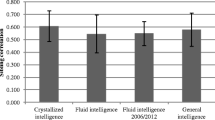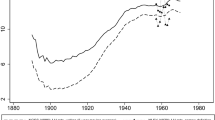Abstract
This paper explores the correlates of the intelligence quotient and cognitive ability by focusing on genetic distance to frontier nations. The results based on cross-sectional data from 167 countries suggest that genetic distance to global frontiers has a negative relationship with the employed human capital variables. Countries that are genetically far from leading nations tend to have lower levels of human capital with the negative correlation to the USA frontier averagely higher relative to the UK frontier. The sign is consistent and survives the control of macroeconomic, geographic, institutional and other covariates. Policy implications are discussed.


Similar content being viewed by others
Notes
The Flynn effect represents a phenomenon where-by on average the Intelligence Quotient (IQ) scores have been increasing worldwide over time, with younger generations performing relatively better than their older counterparts. The average IQ score increases by about 10 points per generation.
We do not believe in race superiority, whatsoever.
We invite the interested reader to refer to the G-Econ project for more information.
References
Ager, P., & Brückner, M. (2013). Immigrants’ genes: genetic diversity and economic development in the US. MPRA Paper No. 51906.
Angeles, L. (2012). Is there a role for genetics in economic development? University of Glasgow. Accessed April 24, 2015, from http://www.gla.ac.uk/media/media_221391_en.pdf.
Ang, J. B., & Kumar, S. (2014). Financial development and barriers to the cross-border diffusion of financial innovation. Journal of Banking & Finance, 39, 43–56.
ARWU (2014). Academic ranking of world universities. ARWU 2014 Press Release. Center for World-Class Universities at Shanghai Jiao Tong University.
Ashraf, Q., Galor, O., & Klemp, M. (2014). The out of Africa hypothesis of comparative development reflected by night time light intensity. Working Paper. Brown University. Department of Economics 2014.
Ashraf, Q., & Galor, O. (2013). The “Out of Africa” hypothesis. Human genetic diversity and comparative economic development. American Economic Review, 103, 1–46.
Asongu, S.A., & Kodila-Tedika, O. (2015). Is poverty in the African DNA(Gene)? African Governance and Development Institute Working Paper No. 15/011, Yaoundé.
Asongu, S. A. (2014a). The impact of health worker migration on development dynamics: Evidence of wealth effects from Africa. The European Journal of Health Economics, 15(2), 187–201.
Asongu, S. A. (2014b). Globalization and health worker crisis: What do wealth-effects tell us? International Journal of Social Economics, 41(12), 1243–1264.
Barber, N. (2005). Educational and ecological correlates of IQ: A cross-investigation. Intelligence, 33, 273–284.
Campbell, D. L., & Pyun, J. H. (2015). The diffusion of development: Along genetic or geographic lines? Journal of International Development. doi:10.1002/jid.3059.
Cardella, E., Kalcheva, I., & Shang, D. (2015). Financial development and genetic diversity. Texas Tech University. Accessed April 13, 2015, from http://papers.ssrn.com/sol3/papers.cfm?abstract_id=2409500.
Cavalli-Sforza, L. L., Menozzi, P., & Piazza, A. (1996). The history and geography ofhuman genes. Princeton: Princeton University Press.
CIA. (2010). Central Intelligence Agency. The World Factbook 2010.
Cook, C.J. (2013). The natural selection of infectious disease resistance and its effect on contemporary health. Division of Health Policy and Management. Yale School of PublicHealth. Accessed April 13, 2015, from https://www.aae.wisc.edu/events/papers/DevEcon/2013/cook.09.19.pdf.
Davies, G., Tenesa, A., Payton, A., Yang, J., Harris, S. E., Liewald, D., et al. (2011). Genome-wide association studies establish that human intelligence is highly heritable and polygenic. Molecular Psychiatry, 16(10), 996–1005.
Deary, I., & Johnson, W. (2010). Intelligence and education: Causal perceptions drive analytic processes and therefore conclusion. International Journal of Epidemiology, 39(5), 1362–1369.
Denny, K. (2009). On a dubious theory of cross-country differences in intelligence. Journal of Evolutionary Psychology, 7(4), 341–346.
Di Tella, R., & Macculloch, R. (2009). Why doesn’t capitalism flow to poor countries? Brookings Papers on Economic Activity, 2009(Spring), 285–332.
Easterly, W. R. (2011). Global development network growth database. The World Bank. http://econ.worldbank.org/WBSITE/EXTERNAL/EXTDEC/EXTRESEARCH/0,,contentMDK:20701055~pagePK:64214825~piPK:64214943~theSitePK:469382,00.html. Accessed 14 June 2015.
Guedes, J., Bestor, T.C., Carrasco, D., Flad, R., Fosse, E., Herzfeld, M., Lamberg-Karlovsky, C.C., Lewis, C.M., Liebmann, M., Meadow, R., Patterson, N., Price, M., Reiches, M., Richardson, S., Shattuck-Heidorn, H., Ur, J., Urton, G., & Warinner, C. (2013). Is poverty in our genes? A critique of Ashraf and Galor, “The ‘Out of Africa’ hypothesis, human genetic diversity, and comparative economic development,” American Economic Review, Current Anthropology, 54(1), 71–79.
Huber, P. J. (1973). Robust regression: Asymptotics, conjectures and Monte Carlo. The Annals of Statistics, 1, 799–821.
Hunt, E. (2012). What makes nations intelligent? Perspectives on Psychological Science, 7(3), 284–306.
Jacob, T. (2010). A compensation for cold weather: Higher IQs. Pacific Standard. Accessed April 6, 2015, from http://www.psmag.com/books-and-culture/a-compensation-for-cold-weather-higher-iqs-25414.
Jaffe, K., Ríos, A., & Flórez, A. (2013). Statistics shows that economic prosperity needs both high scientific productivity and complex technological knowledge, but in different ways. Universidad Simón Bolívar (USB). Accessed September 3, 2015, from http://www.interciencia.org/v38_02/150.pdf.
Johnson, W., Penke, S., & Spinath, F. M. (2011). Heritability in the era of molecular genetics: Some thoughts for understanding genetic influences on behavioral traits. European Journal of Personality, 25, 254–266.
Kalonda-Kanyama I., & Kodila-Tedika, O. (2012). Quality of institutions: Does intelligence matter? Working Papers No. 308. Economic Research Southern Africa.
Kanazaw, S. (2008). Temperature and evolutionary novelty as forces behind the evolution of general intelligence. Intelligence, 36, 99–108.
Kaufmann, D., Kraay, A., & Mastruzzi, M. (2010). The worldwide governance indicators: Methodology and analytical issues. World Bank Policy Research Working Paper No. 5430.
Kiszewski, A., Mellinger, A., Spielman, A., Malaney, P., Sachs, S. E., & Sachs, J. (2004). A global index representing the stability of malaria transmission. The American Journal of Tropical Medicine and Hygiene, 70(5), 486–498.
Kodila-Tedika, O., & Mutascu, M. (2014). Tax revenues and intelligence: Cross-sectional evidence. MPRA Paper No. 57581. University Library of Munich, Germany.
Kodila-Tedika, O. (2014). Governance and intelligence: Empirical analysis from African data. Journal of African Development, 16(1), 83–97.
Kodila-Tedika, O., & Asongu, S. A. (2015). The effect of intelligence on financial development: A cross-country comparison. Intelligence, 51, 1–9.
Kodila-Tedika, O., & Bolito-Losembe, R. (2014). Poverty and intelligence: Evidence using quantile regression. Economiic Researrch Guarrdiian, 1, 25–32.
La Porta, R., Lopez-de-Silanes, F., Shleifer, A., & Vishny, R. W. (1999). The quality of government. Journal of Law, Economics, and Organization, 15(1), 222–279.
Lai, C.-Q. (2006). How much of human height is genetic and how much is due to nutrition? Scientific American. Retrieved from www.scientificamerican.com/article.cfm?id=how-much-ofhuman-height
Lutz, W. (2009). Sola scholaetsanitate: Human capital as the root cause and priority for international development? Philosophical Transactions of the Royal Society, B364, 3031–3047.
Lynn, R., & Vanhanen, T. (2002). IQ and the wealth of nations. Westport, CT: Praeger.
Lynn, R., & Vanhanen, T. (2006). IQ and global inequality. Augusta, GA: Washington Summit Publishers.
Lynn, R., & Vanhanen, T. (2012). National IQs: A review of their educational. cognitive, economic, political, demographic, sociological, epidemiological, geographic and climate correlates. Intelligence, 40(2), 226–234.
Meisenberg, G., & Lynn, R. (2011). Intelligence: A measure of human capital in nations. Journal of Social, Political and Economic Studies, 36(4), 421–454.
Midi, H., & Talib, B. A. (2008). The performance of robust estimator on linear regression model having both continuous and categorical variables with heteroscedastic errors. Malaysian Journal of Mathematical Sciences, 2(1), 25–48.
New, M., Lister, D., Hulme, M., & Makin, I. (2002). A high-resolution data set of surface climate over global land areas. Climate Research, 21(1), 1–25.
Nisbett, R. E. (2009). Intelligence and how to get it. New York: Norton.
Nordhaus, William D. (2006). Geography and macroeconomics: New data and new findings. Pro-ceedings of the National Academy of Sciences, 103(10), 3510–3517.
Pak, S. (2010). The growth status of North Korean refugee children and adolescents from 6 to 19 years of age. Economics & Human Biology, 8, 385–395.
Rindermann, H. (2007). The g-factor of international cognitive ability comparisons: The homogeneity of results in PISA, TIMSS, PIRLS and IQ tests across nations. European Journal of Personality, 21, 667–706.
Rindermann, H., Kodila-Tedika, O., & Christainsen, G. (2015). Cognitive capital, good governance, and the wealth of nations. Intelligence, 51, 98–108.
Rousseeuw, P. J., & Yohai, V. J. (1984). Robust regression by means of S-estimators. In J. Franke, W. Hardle, & R. D. Martin (Eds.), Robust and nonlinear time series analysis (pp. 256–276). New York: Springer.
Rushton, J. P., & Jensen, A. R. (2005). Thirty years of research on race differences in cognitive ability. Psychology, Public Policy, and Law, 11, 235–294.
Salibian-Barrera, M., & Yohai, V. J. (2006). A fast algorithm for S-regression estimates. Journal of Computational and Graphical Statistics, 15, 414–427.
Schwekendiek, D. (2009). Height and weight differences between North and South Korea. Journal of Biosocial Science, 41, 51–55.
Sequeira, T., Santos, M., & Ferreira-Lopes, A. (2013). Human capital and genetic diversity. MPRA Paper No. 49135.
Spolaore, E., & Wacziarg, R. (2009). The diffusion of development. Quarterly Journal of Economics, 124, 469–529.
Weil, D.N. (2010). The impact of malaria on African development over the Longue Durée. Brown University and NBER.
Wicherts, J. M., Borsboom, D., & Dolan, C. V. (2010). Why national IQs do not support evolutionary theories of intelligence. Personality and Individual Differences, 48(2), 91–96.
Wicherts, J. M., Dolan, C. V., Carlson, J. S., & van der Maas, H. L. J. (2010a). Another failure to replicate Lynn’s estimate of the average IQ of sub-Saharan Africans. Learning and Individual Differences, 20, 155–157.
Wicherts, J. M., Dolan, C. V., Carlson, J. S., & van der Maas, H. L. J. (2010b). Raven’s test performance of sub-Saharan Africans: Average performance, psychometric properties, and the Flynn effect. Learning and Individual Differences, 20, 135–151.
Wicherts, J. M., & Wilhelm, O. (2007). What is the national g-factor? European Journal of Personality, 21(5), 763–765.
Williams, B.J. (2013). Does human genetic diversity affect net productivity?. Master’s thesis. Accessed April 14, 2015, from http://scholarcommons.sc.edu/etd/2419.
Yohai, V. J. (1987). High breakdown-point and high efficiency robust estimates for regression. The Annals of Statistics, 15, 642–656.
Acknowledgments
The authors are highly indebted to the editor and referees for the constructive comments.
Author information
Authors and Affiliations
Corresponding author
Rights and permissions
About this article
Cite this article
Kodila-Tedika, O., Asongu, S.A. Genetic distance and cognitive human capital: a cross-national investigation. J Bioecon 18, 33–51 (2016). https://doi.org/10.1007/s10818-015-9210-7
Published:
Issue Date:
DOI: https://doi.org/10.1007/s10818-015-9210-7




